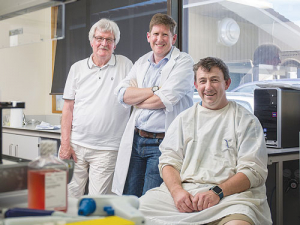Tuberculosis was widespread in the wild and Griffin says there were fears TB would prevent the industry from ever developing properly.
The only available test for TB at the time was a skin reaction test which produced false positives because of reactions to other environmental bacteria, and false negatives because some TB-infected animals failed to develop any reaction.
“If they had killed to kill all the animals that reacted they would have been wasting a lot of animals and still be missing some of the diseased animals.
“They said ‘we’ve got to do better than this’ so we developed some lab-based tests that allowed them to more accurately diagnose TB and that’s where we started in 1985,” Griffin told Rural News.
In the mid 1990s, the lab’s work expanded into other species including sheep, cattle and even African wildlife, and it recognised that change in focus by changing its name to Disease Research Laboratory.
On Frank Griffin’s retirement from the university in 2016 he faced the choice of closing the lab down, or “rebooting” it elsewhere. With the help of Otago Innovation Ltd (OIL), the commercial arm of the university, it then became Disease Research Ltd, based at the Invermay campus.
‘We’re not very imaginative, right? So we’ve kept the moniker DRL all the way along,” he says.
“We’ve had a long association with Invermay and we’ve enjoyed the facilities here. They’re excellent and we’re now living very happily at Invermay.”
Griffin says the goal of a good diagnostic or research activity was “essentially to make yourself redundant”.
“That means you’ve done the job and you move to a new job. So at this stage, we have worked with the deer industry to almost eradicate TB as a disease. There may now be two or three infected herds in the country, so that means there isn’t a need for much diagnostics on TB.”
“We then transitioned to look at para-TB (Johne’s disease) which is a related organism to TB. We’ve been working on Johne’s in deer for the last 20 years. It’s now decreasing as a significant disease so recently we’ve moved into dairy.”
Because the deer industry is small and agile it had been able to move quickly to resolve its problems, Griffin says.
DRL is now working on Johne’s in dairy cattle and goats, and other viral diseases including bovine viral diarrhoea (BVD) in dairy cattle and caprine arthritis encephalitis (CAE) in goats, said Griffin.
“So we keep evolving to embrace new species and new diseases.”
Griffin said that when working with a new disease or species it is easy just to apply tests and assume they have benefits, but DRL has done a lot of cost-benefit analysis and shown “quite conclusively” that intervention does in fact save money by reducing losses in animals and production.
“There is a good economic basis for proceeding with control programmes, either to prove you don’t have the disease or to eliminate the disease if you do have it. It’s just a matter of applying the appropriate level of intervention for the level of problem.”
He says diseases such as Johnes present a chronic process that take a long time to cause disease and only affect a relatively small proportion of a herd.
“You’re trying to apply management appropriate to the risk you are living with. If you’re living with low risk all you need to do is monitor it.
“A lot of these diseases are also heavily stress-related. If you’ve got nutritional stress or management stress that will cause the disease to become much more evident,” Griffin explains.









